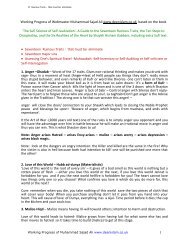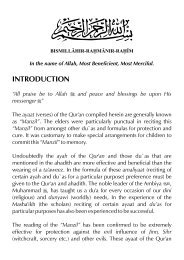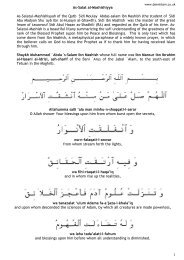Sufi Introduction to the 99 Names of Allah and sufi ... - Deen islam
Sufi Introduction to the 99 Names of Allah and sufi ... - Deen islam
Sufi Introduction to the 99 Names of Allah and sufi ... - Deen islam
You also want an ePaper? Increase the reach of your titles
YUMPU automatically turns print PDFs into web optimized ePapers that Google loves.
Collected by Muhammad Sajad Ali - webmaster – www.deen<strong>islam</strong>.co.uk - 10 th December 2009<br />
'Alîm denotes knowing with certainty, especially intuitive knowing, omniscience.<br />
Khabîr denotes an underst<strong>and</strong>ing <strong>of</strong> <strong>the</strong> inner qualities, secrets <strong>and</strong> true reality.<br />
(Also written as al-alim, al-aleem, al-aliim, <strong>the</strong> All-Knowing: ya alim, ya aleem, ya aliim)<br />
20. Al-Qâbid-The Withholder, The Restrainer <strong>of</strong> Sustenance , The Constric<strong>to</strong>r<br />
The Constric<strong>to</strong>r. He who constricts <strong>and</strong> restricts.The One who constricts <strong>the</strong> sustenance<br />
YA QABIDU: O Constric<strong>to</strong>r! If, for forty days, one eats 50 morsels on which this glorious Name has<br />
been written, one will never suffer starvation. Whoever writes (with saffron or by <strong>the</strong> mere action<br />
<strong>of</strong> one's finger) this name <strong>of</strong> <strong>Allah</strong> on four morsels <strong>of</strong> bread (roti) each day for 40 days <strong>and</strong> eats<br />
<strong>the</strong>m, will be safeguarded against hunger, thirst, pain etc Insha-<strong>Allah</strong>. Any person who writes this<br />
name on four pieces <strong>of</strong> a roti <strong>and</strong> eats it for 40 days he will always be prevented from <strong>the</strong> problems<br />
<strong>of</strong> food, thirst, injuries <strong>and</strong> pain.<br />
The One whose wisdom causes withholding, ei<strong>the</strong>r physically or spiritually. The One whose wisdom<br />
decides when <strong>to</strong> withhold something, or make something scarce.<br />
The One whose wisdom may elect <strong>to</strong> withhold joy <strong>and</strong> expansion <strong>of</strong> <strong>the</strong> heart.<br />
The One in whose h<strong>and</strong> all hearts are held. The One whose h<strong>and</strong> collects all souls at <strong>the</strong> time <strong>of</strong><br />
death.<br />
From <strong>the</strong> root q-b-d which has <strong>the</strong> following classical Arabic connotations:<br />
<strong>to</strong> take in <strong>the</strong> h<strong>and</strong>, clutch, lay hold <strong>of</strong><br />
<strong>to</strong> grasp, grip, seize, hold firmly<br />
<strong>to</strong> have absolute ownership <strong>of</strong> something (hold in <strong>the</strong> h<strong>and</strong>)<br />
<strong>to</strong> give <strong>and</strong> take (h<strong>and</strong> over <strong>and</strong> take in h<strong>and</strong>), barter<br />
<strong>to</strong> contract, shrink, draw <strong>to</strong>ge<strong>the</strong>r, collect <strong>to</strong>ge<strong>the</strong>r<br />
<strong>to</strong> draw in (as a bird contracting a wing)<br />
<strong>to</strong> withhold, make scanty, make scarce<br />
<strong>to</strong> contract <strong>the</strong> heart, i.e. distress, depression, lack <strong>of</strong> joy<br />
The name Qâbid is not specifically used as a Beautiful Name in <strong>the</strong> Qur'ân.<br />
The underlying roots <strong>of</strong> Qâbid give a sense <strong>of</strong> give <strong>and</strong> take, a movement back <strong>and</strong> forth, an<br />
underlying rhythm <strong>of</strong> ebb <strong>and</strong> flow, like <strong>the</strong> rhythmical folding <strong>and</strong> unfolding <strong>of</strong> a bird's wings in<br />
flight, or <strong>the</strong> rising <strong>and</strong> setting <strong>of</strong> <strong>the</strong> sun, or <strong>the</strong> endless cycles <strong>of</strong> life <strong>and</strong> death.<br />
Qâbid (constric<strong>to</strong>r) <strong>and</strong> Bâsit (exp<strong>and</strong>er) are opposites.<br />
The Arabic lexicon <strong>and</strong> commentary Tâj al-'Arûs, as interpreted by E.W. Lane, says:<br />
Qabd [Qâbid] <strong>and</strong> Bast [Bâsit] are terms applied by <strong>the</strong> investiga<strong>to</strong>rs <strong>of</strong> truth among <strong>the</strong> Sûfîs <strong>to</strong> <strong>the</strong><br />
two contrary states <strong>of</strong> <strong>the</strong> heart, from both <strong>of</strong> which it is seldom or never free: <strong>the</strong> former being an<br />
affection <strong>of</strong> <strong>the</strong> heart withholding it from dilation <strong>and</strong> joy; whe<strong>the</strong>r <strong>the</strong> cause <strong>the</strong>re<strong>of</strong> be known, as<br />
<strong>the</strong> remembrance <strong>of</strong> a sin or an <strong>of</strong>fence, or <strong>of</strong> an omission, or be not known...<br />
30







